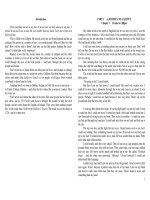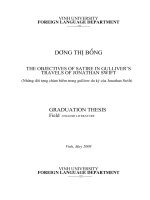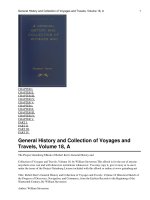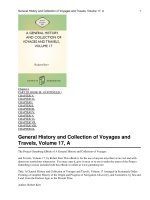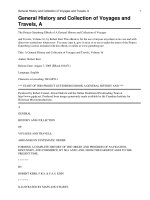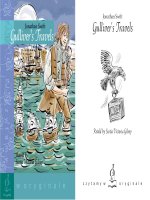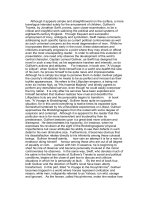gullivers travels
Bạn đang xem bản rút gọn của tài liệu. Xem và tải ngay bản đầy đủ của tài liệu tại đây (31.22 KB, 3 trang )
Gulliver's TravelsFebruary 27, 1996 As a seemingly wise and
educated man, throughout the novel Gulliver's Tarvels, the narrator
cleverly gains the reader's respect as a thinking and observant individual.
With this position in mind, the comments and ideas that Gulliver inflicts
upon those reading about his journeys certainly have their own identity as
they coincide with his beliefs and statements on the state of humanity and
civilization in particular. Everywhere Gulliver goes, he seems to comment
on the good and bad points of the people he encounters. Sometimes, he
finds a civilization that he can find virtues within, but he also encounters
peoples and places which truly diusgust him in their manner of operation
and civility. Overall, Swift gives Gulliver a generally negative and cynical
attitude towards the manner in which his current day English counterparts
behaved cleverly disguised in the subtext of his encounters with other
nations that either contrasted the way they lived, or mirrored unflatteringly
his contemporaries lifestyles. In Gulliver's first voyage to Lilliput, his
role as the town giant not only put into perspective the selfishness and
unrelenting need for power of the human race, but also opened his eyes
to the untrusting and ungrateful nature of those aforementioned. When
he first arrived in their land, the Lilliputians opted to tie him up, giving him
no freedom, which he luckily did not object to. Then, once they had
developed a somewhat symbiotic realationship with him, Gulliver was
basically forced to abide to their whims and fancies, and ultimately to be
their tool in war. At any time, Gulliver could have escaped their grasp, but
instead, he opted to stay and observe and oblige to their customs. He
was a very agreeable guest. He did tricks for them, he saved their
princess from her burning castle, he defeated their mortal enemies, and
all he was rewarded with was their spite and mistrust. From the start, no
matter how cordial and well-behaved he was, there was little trust
bestopwed upon him by the people that bound him to their home. Also,
Gulliver explains the rediculous manner in which one becomes accredited
in their society. "For as to that infamous practice of acquiring great
Employment by dancing on the Ropes, or Badges of Favor and
Distinction by leaping over sticks, and creeping under them; the reader is
to observe, that they were first introduced by the Grand father or the
Emperor now reigning; and grew to the present Height, by the gradual
increase of Party and Faction." This rediculous means of self-validation
seems strickingly similar to some of the methods with which people will
resort to in our societies, where personal achievment and values are
secondary to their outward appearance, ability to impress, and skills
totally unnessesary to the job described. Gulliver's description of their
government, way of life, and logic patterns reflected either his grievances
with or his innability to comprehend the manner in which many decisions,
traditions, and wyas of living developed in our own society. He also,
though, pointed out some redeeming values which he found in their way
of living such as their innability to accept fraud, and their total separation
of purity of smut, through reward and punishment. When it came down to
it though, the Lilliputian's lack of trust towards their giant helper ruined
their chances of him staying, and Gulliver was forced to leave. He found
their hospiatlity to be great, but only at a severe stress to their own
resources. At this point, some very strong assertions have been made
about humanity, but we must go farther into the story to draw any real
conclusions. Although there wasn't much said in this section of the book,
the second voyage to Brobdignag put Gulliver in a very compromising
situation which made him simply the pawn of social commentary by Swift.
The people of Brobdignag treated Gulliver in an almost rediculous
manner. They put him in a cage like we do with rodents, and were truly
simple in their ideas. "The Learning of this People is very defective;
consiting only in Morality, History, Poetry, and Mathematicks; wherin they
must be allowed to excel. But, the last of these is wholly applied to what
may be useful in Life; to the Improvement of Agriculture and all
Mechanical arts; so that among us it would be little esteemed. And as to
ideas, Entitites, Abstractions ands Transcendentals, I could never drive
the least Conception into their heads." This situation made Gulliver see a
people totally preoccupied with their own ideas, and showed their
ignorance of possibly better ideas simply becvause they refused to
acknowledge the possible validity of a little man's ideas. It is this attribute
of human thought patterns that many times allows us to miss the fine
details in life, overlooking them as trivial. When venturing in Laputa,
Gulliver was thougholy disgusted by the adamant ways of the inhabitants
there. Their obsession with the very specifics of their life not only put
Gulliver off, but made him realize the follies of all those like them. Their
oblivion to the obvious tendencies life engulfs made a great impression
on him, seeing their wives totally confounded by the male inhabitants
fetish with the workings that they had managed to contrive somehow. Not
only did these people behave strangely, but their odd manner of acting
had affected their outward appearance, transforming them into
convuluted, wretched creatures. Their focus on Mathematicks and
Musick were not viewed as unattractive traits, but their
narrow-mindedness, and absense of thought on other subjects alarmed
him, as he saw the reprocutions of such a lifestyle. In Balnibari, the
people there also had a very distorted manner of living. Their
beurocratic, innefficient machine of experiments, improvements, and
theories appalled Gulliver as he saw the degradation in society that
occured as a result of it. Both of these lands, although on somewhat
opposite ends of the spectrum belonged to the same family of false
maxims to live by. Both systems showcased many of the problems our
own societies can face. If we ignore problems we have, that can make us
worse, but if we try to fix every imperfection, no matter how
rediculous-seeming, we would be totally engulfed by the process. In
Gulliver's last voyage to the land of the Houyhnhnms, there was by far the
most demonstrative of comparisons to our society, or should I say,
contrasts. When he met those people, animals that we know as horses,
he was shocked by their wisdom, sensibility, and kindness. On the other
hand, the Yahoos, most closely related to humans as we know them were
vile, uneducated, badly-behaved creatures. This reversal of roles
demonstrated the shotty treatment we have for lower creatures, even
though they have many traits that could be described as positive that we
easily overlook. When Gulliver returns to England, he is disgusted not
only by the sight, smell, and actions of the people there, but he cant even
stand his own family. It is this fact that clearly shows how aweful and
pitiful the human race would seem if one had the opporotunity to step
back and take an honest, unobstructed view of it. Throuighout
Guliver's Travels, Swift uses anecdotes told through Gulliver's eyes to
demonstrate the vices and virtues associated with the way we live. No
matter where he was, he was able to see enviable aspects of their
society, and to demean the parts of their life that were silly, illogical, and
offensive. From each experience he grasped a stronger understanding of
what it meant to run a government, how Power and prestige could
corrupt, and how false logic could corrup a community. Not only a
powerful social commentary, Gulliver's Travels teaches us an important
lesson about what we must keep important in our lives.
